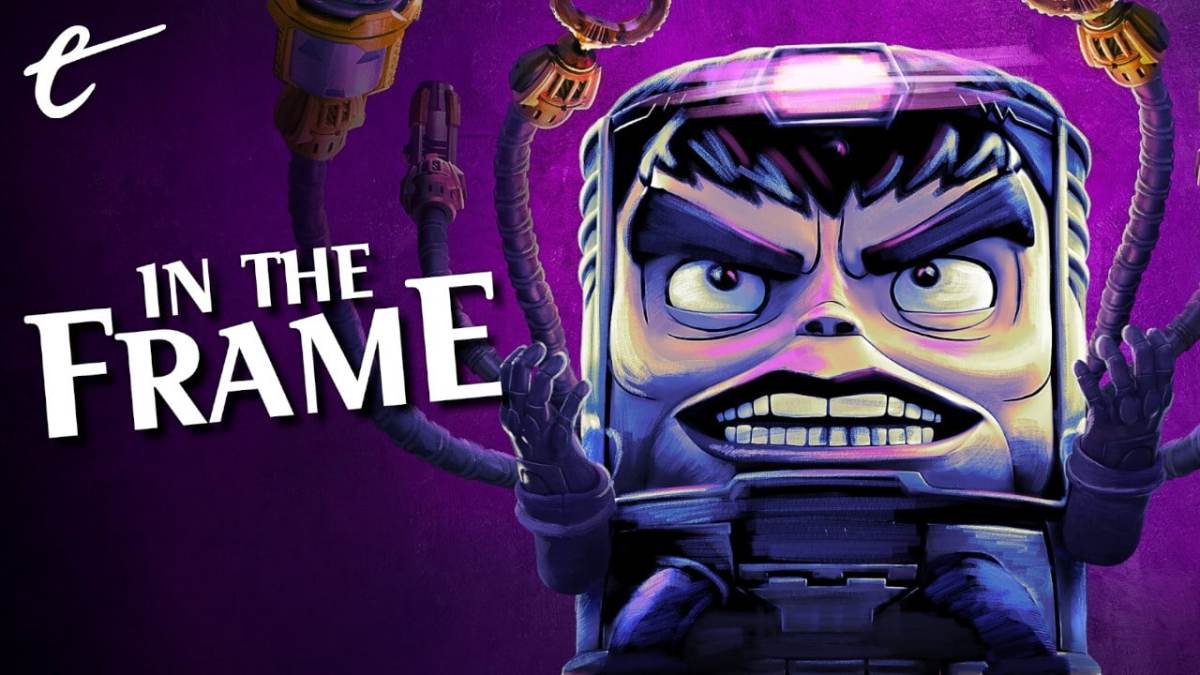Even just looking at him, one would strongly suspect that M.O.D.O.K. was a Stan Lee and Jack Kirby creation.
The visually distinct villain was introduced as an antagonist for Captain America in the late 1960s, a technician named George Tarleton who was transformed by the villainous Advanced Idea Mechanics (A.I.M.) into a Mental Organism Designed Only for Killing. Like many villains of the era, M.O.D.O.K. was a striking visual more than a fully developed character, a gigantic head floating in a hoverchair spouting maniacal clichés. He was unapologetically a comic book character.
M.O.D.O.K. has seldom been an A-list comic book supervillain. There is a reason why the Captain America film franchise opted to turn Batroc the Leaper (Georges St-Pierre) into a recurring antagonist ahead of introducing a live-action take on M.O.D.O.K. However, the character has remained a recurring object of fascination for both fans and creators, anchoring a variety of endearing one-shots and miniseries across decades of comic book continuity.
In many ways, Hulu’s recent M.O.D.O.K. feels of a piece with the character’s long history as a cult favorite also-ran. The series was created by Jordan Blum and Patton Oswalt, who had bonded over a shared love of pop culture on American Dad and had previously attempted to launch an animated comedy called Working Class Hero. The two were drawn to the bizarre comic book villain, and their love of that oddness shines through in the finished product.
M.O.D.O.K. is the story of the eponymous villain (Oswalt) as he grapples with a midlife crisis. His plans to conquer the world have come to nothing and generated enough debt that he has had to sell A.I.M. to the global conglomerate GRUMBL. Simultaneously, M.O.D.O.K.’s personal life is falling apart as his wife Jodie (Aimee Garcia) demands a divorce and M.O.D.O.K. struggles to understand his two children, Louis (Ben Schwartz) and Melissa (Melissa Fumero).

At its core, M.O.D.O.K. juxtaposes familiar workplace and domestic sitcom tropes with the heightened reality of comic book storytelling. Many of the episodes are riffs on tried-and-tested sitcom plots, with M.O.D.O.K. trying to one-up his rival Iron Man (Jon Hamm), struggling to impress the GRUMBL board, or attempting to undermine Jodie’s whirlwind romance with hunky actor / superhero Simon Williams (Nathan Fillion).
The heart of the show is the contrast of these setups with the stakes of a superhero universe. When M.O.D.O.K. struggles to understand Lou’s obsession with magic in “Tales from the Great Bar-Mitzvah War!,” the plot inevitably drops the two characters off in Asgard. When M.O.D.O.K. has the inevitable sitcom night out with a group of friends in “If Saturday Be… For the Boys!,” he ends up scheming with a group of low-rent supervillains to steal Captain America’s shield.
However, all of this is underpinned with a genuine and abiding affection for the source material. M.O.D.O.K. is a celebration of the goofy and the surreal world of comic books. It is clear that Oswalt and Blum both adore the Marvel Universe and are thrilled at the prospect of playing with these particular toys, a sentiment only heightened by the decision to animate M.O.D.O.K. in the toy theater style of Robot Chicken. Seth Green is even credited as producer, cementing the association.
Although M.O.D.O.K. lifts its plotting from sitcoms, it lovingly draws from the tropes and conventions of comics. The first episode is titled “If This Be… M.O.D.O.K.!,” a reference to the character’s first full appearance. The central conflict across the season is between M.O.D.O.K. and his time-displaced younger self, angry at the failure that he has become. (His younger self even calls it out as “a glorious metaphor.”) The finale is titled “Days of Future M.O.D.O.K.s,” in an obvious nod to its core influence.

Even the first season’s closing scenes draw on the classic comic book trope of a character standing victorious at the end of history. It recalls Jason Aaron and Eric Ribic’s King Thor or Donny Cates and Geoff Shaw’s Thanos Wins. In superhero comics, this trope often serves as a commentary on the genre’s perpetual second act by demonstrating the tension inherent in having a comic book character reach the end of their story, but M.O.D.O.K. cleverly uses it as a hefty emotional payoff.
Beyond borrowing these structural cues, M.O.D.O.K. is populated with loving references to the source material. At one point, M.O.D.O.K. opens a portal to the Brood planet and accidentally unleashes the party-loving Ciegrimites on an unsuspected world. This is a deep cut, given that the aliens have only made a handful of appearances since their debut in Bob Layton’s Hercules. There are lots of other little in-jokes and references, including graffiti referencing “the Yancy Street Gang.”
M.O.D.O.K. is unashamed of the goofiness and geekiness of these properties. The gigantic purple-pants-wearing dragon Fin Fang Foom makes a number of appearances over the season. The show even manages to fold a number of X-Men villains into its world, including appearances from characters like Mr. Sinister (Kevin Michael Richardson) or Arcade (Alan Tudyk). Reportedly the only characters off limits to the team were Stilt-Man, Paste-Pot Pete, and Turner D. Century.
Existing as an animated sitcom on Hulu, M.O.D.O.K. provides an interesting contrast with the Marvel Cinematic Universe (the MCU). Much is made of the fidelity of the MCU to the source material, with fans describing it as “the most faithful live-action adaptation of comic book superheroes ever produced” and Kevin Feige insisting that such faithfulness “is always a guide point, a North Star for us as we lead these giant productions into reality are right from those books where it all started.”

However, outside of exceptional projects like Guardians of the Galaxy and Thor: Ragnarok, the MCU seems constantly worried about how audiences might react to the goofier elements of the source material. It seems unlikely Hawkeye (Jeremy Renner) will ever earnestly wear his original costume. It’s notable that the franchise rebranded “the Infinity Gems” as “the Infinity Stones” and rewrote Thanos’ (Josh Brolin) backstory, opting for “a more natural, grounded” approach to the Mad Titan.
Thanos is a giant purple nihilist who uses a magic glove to erase half the life in the universe; maybe he doesn’t have to be “grounded.” At their best, superhero stories are often weird and unusual, and M.O.D.O.K. leans into those big ideas. One of the show’s primary antagonists is “Hexus the Living Corporation,” a sentient company that moves from world to world like a parasitic idea. Hexus was created by Grant Morrison and J.G. Jones for their relatively obscure Marvel Boy miniseries.
WandaVision drew heavily from the classic comic book arc that found Wanda Maximoff (Elizabeth Olsen) and Vision (Paul Bettany) moving into the suburbs to start a family. However, while the series carried over the broad strokes like Wanda’s imaginary children Billy (Julian Hilliard) and Tommy (Jett Klyne), it glossed over some of the more outlandish elements of the story, such as when the children are absorbed by the villainous Master Pandemonium and converted into his arms.
M.O.D.O.K. is completely unembarrassed by this sort of comic book plotting and even features a small cameo from Master Pandemonium (Jordan Blum). For all that M.O.D.O.K. is a domestic and workplace sitcom, it has an infectious enthusiasm for these characters and concepts that arguably surpasses that of the MCU. Like Legion before it, M.O.D.O.K. features inventive and playful set pieces that are much more creative and compelling than a lot of the MCU’s action beats.

This makes it even more frustrating that M.O.D.O.K. will likely be an evolutionary dead end for Marvel Studios. The project originated before Marvel Television was folded into Marvel Studios, paving the way for the streamlining of film and television universes that would lead to shows like WandaVision and The Falcon and the Winter Soldier. It is notable that the show was not released on Disney+, but instead on the Disney subsidiary Hulu.
M.O.D.O.K. had originally been envisaged as part of a wave of off-kilter shows based on fringe Marvel properties: Hit-Monkey, Tigra & Dazzler, and Howard the Duck. The obvious point of comparison here is something like the company’s miniature Netflix universe, a parallel reinforced by the plan to structure these four shows into a crossover known as The Offenders. When Marvel Television was folded into Marvel Studios, all but M.O.D.O.K. and Hit-Monkey were scrapped.
This represents the culmination of the homogenization of Marvel Studios’ output. The first trailer for Chloe Zhao’s The Eternals dropped this week, following Kevin Feige’s praise for Zhao’s work as “so beautiful.” However, the trailer seemed frustratingly desaturated and generic, right down to a closing joke reminding viewers that it exists in the same world as The Avengers. The trailer offered very little of the bold visuals and striking designs that defined Jack Kirby’s work on The Eternals.
As such, M.O.D.O.K. feels like a breath of fresh air in the context of Marvel’s output. It is a superhero adaptation that isn’t in any way ashamed of its comic book roots and that joyfully revels in the bright and bold conventions of the genre. M.O.D.O.K. is a show as inventive as its main character, but it would be a shame if its ambitions ended up as easily thwarted.





